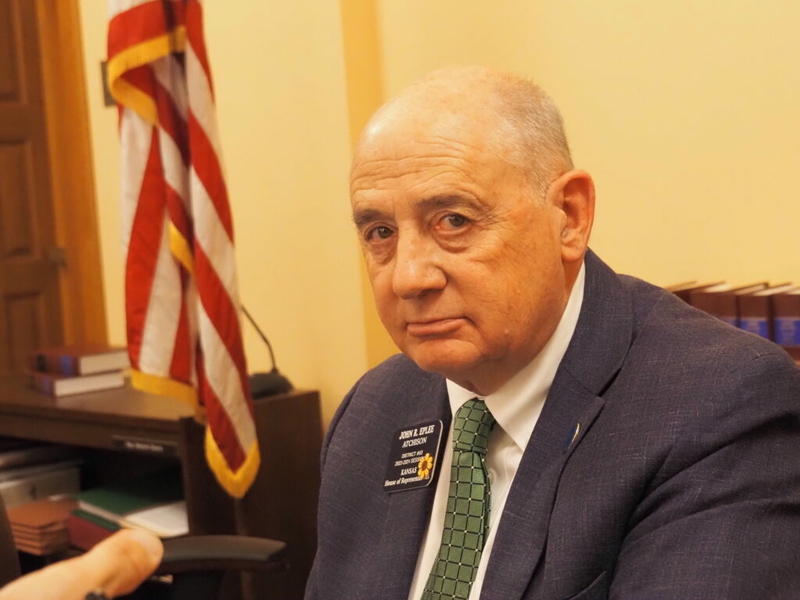Kansas lawmakers classify people with sexual development differences as disabled in revised bill

TOPEKA — Intersex people and those born with sexual development differences would be classified as disabled and required to use separate bathrooms and locker rooms under legislation being considered by Kansas lawmakers.
This designation was added as an amendment to Senate Bill 180, otherwise known as a “women’s bill of rights.” Lawmakers in the House Health and Human Services Committee debated and passed the bill in a little more than 11 minutes Thursday.
The bill states that separate accommodations based on biological sex aren’t unequal, and that people with female reproductive systems need women-only social, educational, athletic and other spaces to ensure safety. The bill would include domestic violence shelters, restrooms and locker rooms as women-only spaces.
Critics have said the bill is a blatant attempt to ban transgender women from women’s spaces.
In its original form, the Kansas legislation defined “females”as having biological reproductive systems developed to produce ova, a definition that excluded intersex people and alienated women without ovaries.
To address the concerns, Rep. John Eplee, R-Atchison prepared an amendment to apply to intersex people and others. The amendment states that those born with sex development differences or “disorders” would be provided legal protections and accommodation under the Americans with Disabilities Act.
Eplee said his goal with the amendment was to give people who fall under the amendment a separate space from men’s and women’s spaces. Eplee said the amendment came about after he listened to testimony asking lawmakers in charge of the bill to consider how it would impact people who didn’t fall into binary biological sex categories. Eplee said the amendment was aimed at providing privacy and a sense of safety for these individuals.
“It would provide security for them for those functions that relate to using the bathroom and changing clothes for an athletic event. So there’s privacy issues addressed,” Eplee said. “That’s the whole purpose of the amendment for nonbinary folks.”
Eplee said they would be classified as disabled to offer them protections.
“People that are disabled do have that recognition and that ability now,” Eplee said. “This is just to say this is somewhat of an expansion of that narrative, because certainly not all intersex folks are disabled. But some are, and this is just to reaffirm that.”
Eplee said he didn’t have all the answers on what the bill entailed, but he thought it would help set a standard in the state of Kansas to give men and women security and privacy in bathroom facilities, lockers and athletic endeavors.
Other lawmakers discussed the disability aspect of the amendment during the Thursday meeting.
Rep. Bill Clifford, R-Garden City, identified Turner Syndrome as an example of a sex development condition where one of two X chromosomes is either missing or partially present, potentially causing ovarian issues or stalled sexual development.
Turner Syndrome is rare overall, and less than half of the people who have it also have extra folds of skin on the neck.
Clifford said women with Turner Syndrome could be embarrassed to change in dressing rooms with other women.
“A person in that state, I don’t think, would want to undress in front of even fellow females,” Clifford said.
The committee chairwoman, Rep. Brenda Landwehr, a Wichita Republican, said people with sexual development differences qualify for protections under the Americans with Disabilities Act, because the act deals with the loss of body functions.
“It’s my understanding that a majority of these individuals would actually have the loss of some body functions, which would make them qualified for the ADA,” Landwehr said.
Rep. Susan Ruiz, D-Shawnee, said this designation was offensive.
“I don’t want to insult them that way,” Ruiz said.

Other reactions
Critics say the legislation doesn’t actually address gender inequality and would be extremely difficult to enforce.
“It’s all an attack on our LGBTQ folks,” said Rep. Mari-Lynn Poskin, D-Leawood.
“My first question about the bill is: Where are my rights? Where is my equal pay? Where is my bodily autonomy, if this is about a women’s bill of rights?” Poskin added.
Poskin referenced former Rep. Stephanie Byers, a Wichita Democrat and Kansas’ first transgender lawmaker, as an example of the women the legislation would harm.
“Where would she go to the bathroom in this building?” Poskin asked.
When asked during the meeting how the bill would be enforced, Landwehr said she had seen schools use faculty bathrooms and dressing rooms to accommodate people.
“In places that don’t have somewhere separate, someone may stand outside the door to allow them privacy so they don’t have to intermingle with individuals they would feel uncomfortable with,” Landwehr said.
Similar legislation to the “women’s bill of rights” has been introduced by Republican lawmakers in North Dakota, Oklahoma and Arizona, among other states.
The Kansas Attorney General’s Office has said the bill’s constitutionality is likely to be challenged.
Eplee said he was aware the bill would most likely lead to a legal challenge if passed into law.
“It’s going to create a challenge to the status quo that will be a legal challenge at some point,” Eplee said. “I’m not going to sit here and tell you how I think it’s going to go because I don’t know that.”








